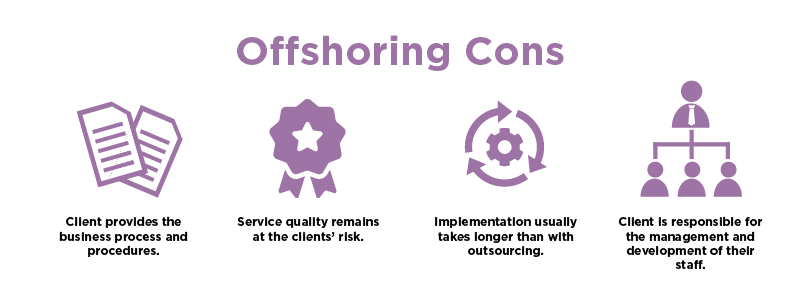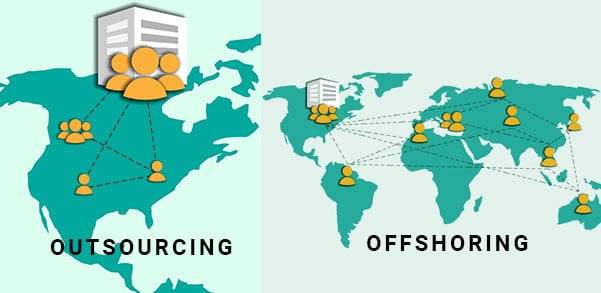Even though more and more businesses across the planet are involved in offshoring and outsourcing, many people use these terms by interchanging them. In both cases, outsourcing and offshoring, the firm uses a third-party company to carry out its functions.
Over the last few decades, we have noticed an increase in the outsourcing of business processes and activities by large companies. Outsourcing means delegating the routine, and the business processes to an external organization to free up their resources. Those resources include money, time, and manpower, for the core activities of the business. On the contrary, offshoring is a type of outsourcing whereby the business process or services is relocated or shifted to a different country, not necessarily to take advantage of lower costs. The two are different terms.
Major differences between outsourcing and offshoring are as follows :
1.Outsourcing refers to relocating non-core business activities to another organization that specializes in those activities. Offshoring refers to the moving of a company’s business to any other country so that it becomes cost-efficient.
2.While outsourcing involves shifting all the major business operations to external parties. Offshoring involves shifting all major activities and offices to other locations.
3.Offshoring is the act of outsourcing a business to another country. While it is a common business practice today, some businesses choose not to off-shore.
4.Outsourcing is accomplished by employing non-employees who perform the work when Offshoring is accomplished by employees of the business entity.
5.The objective of outsourcing is to focus on the core activities of the company while outsourcing is performed to minimize the cost.
Outsourcing

When outsourcing a task, you’re sending it out to a company whose workers are unknown to you. They reassure you that the job will be completed, but because there is no relationship or interaction between business owners and the outsourcing team, there is typically little oversight of the quality of the output as well as accountability.
But while it’s not necessarily a bad business model, it’s important to make sure you’re selecting the right tasks or projects to begin this option. Through outsourcing, you can take advantage of specialized skills from a different company. Cost efficiency and flexible worker labor are also achieved. In an outsourcing model, one can complete several jobs efficiently thus reducing the cost and making it profitable for the organization.
Benefits of Outsourcing

- Monetary advantage: Costs are the chief motivation for outsourcing and this eventually turns into a major obstacle in management.
- Focus on skills: There are a lot of business functions in a company. Take, for example, human resources, information technology, manufacturing, sales, marketing, payroll, planning, accounting, finance, security, transportation, and logistics among others. Some of these activities are not important to the company. An “important” activity offers the company a competitive advantage over its competitors. Today, the activity that the company does better than its competitors is the main reason its customers do business with the company.
- Standard and Potential: If companies don’t have in-house expertise for certain activities, they often turn to outside vendors for assistance. In these cases, outsourcing your business services is more efficient.
- Industry Flexibility: Outsourcing allows a company’s employees to ramp up and down quickly as needed by placing them in different locations. For example, a company may need a large number of software programming experts for about 6 to 8 months to create an application. It is not feasible to hire people for only six months. Outsourcing, however, can provide flexibility concerning hiring and firing, so the company does not have to worry about hiring and firing.
Offshoring

Offshoring is a more dynamic form of outsourcing in that you are sending work to a custom-built team you manage that resides in a different country. Offshoring: it is a technique that can help you do more complex processes as you get to have a dedicated offshore global team or teams composed of highly experienced individuals. They’re often a part of your onshore team, but they are located in a different location, usually in another city. Since they are an extension of the onshore team, thus they follow the same rules and regulations, and one gets to manage them the same way they manage the teams in your home country.
The benefits of off-shoring include high-cost savings, access to a world-class talent pool, managed services, and outsourcing. Whilst you are on your offshore global team it is important to ensure that you can be kept up to date with everything that is going on in the office in your home country.
Benefits of offshoring
- Cost Efficient: Companies often offshore manufacturing or services to developing countries where the wages are extremely low. This results in cost savings. These savings are passed on to the customers, shareholders, and managers of these companies and their customers.
- Competence: The competitive advantage of a nation means that some countries or regions develop a better ecosystem for specific industries. It means there is better availability of skilled humans in that region for specific types of tasks. Through outsourcing, companies can even choose to off-shore certain functions of their business (e.g. call centers for customer support) either captive or outsourced.
Conclusion
Outsourcing and offshoring are both viable options for your business that make it possible to achieve high-quality value and expansion for your company. It is important to differentiate between the two so you can determine which model will complement and integrate well with your existing operations. Also, ensure the business continuity of its operations. Thus, help its operations grow like never before. Outsourcing and offshoring have been in fashion for the last decade. When the outsourcing of any business operation, at a place other than the business’s origin, can be termed as offshoring. The business organization can choose to use these practices either individually or in combination. Offshoring is a type of outsourcing that also involves the use of offshore technology development centers, but that is not the only type of outsourcing.
Optimal Virtual Employee is a renowned outsourcing and offshoring company based in India with a global client base.









